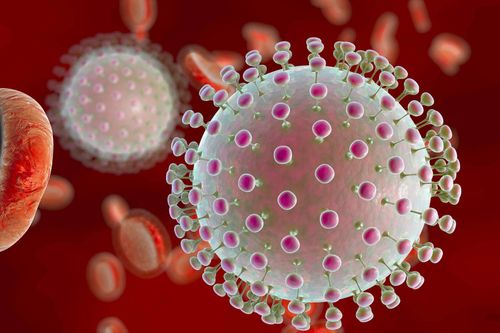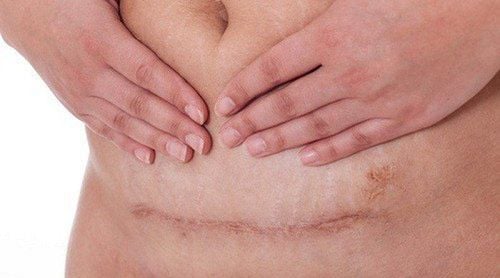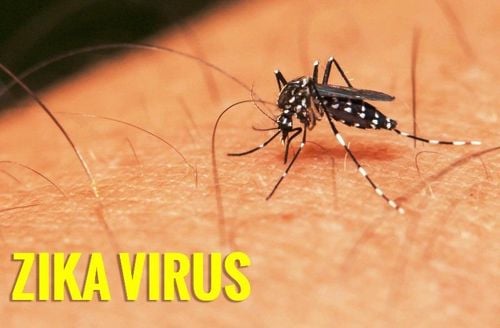This is an automatically translated article.
The article was professionally consulted by Specialist Doctor II Bui Thi Thu - Obstetrician and Gynecologist - Department of Obstetrics and Gynecology - Vinmec Hai Phong International General Hospital.Zika symptoms in pregnancy are usually mild and usually go away within a few days. Although it does not cause much harm to the mother's health, Zika disease can cause serious birth defects in babies, especially microcephaly in babies.
1. Ways of transmission of Zika to pregnant women
Pregnant women can contract Zika from being bitten by an infected Aedes mosquito. There are two types of Aedes mosquitoes that can transmit Zika virus: Aedes aegypti and Aedes albopictus. In which, Aedes aegypti, also known as midges (because mosquitoes have black and white lines on the body) is the causative agent of diseases mainly in tropical and subtropical countries. Aedes mosquitoes often bite people during the day, especially in the early morning or when it is almost dark, mosquitoes often settle on curtains, where clothes hang. In addition to transmitting Zika, the Aedes mosquito is also the causative agent of dengue fever, yellow fever and chikungunya.Zika virus can also be transmitted through sexual contact. According to some studies by the World Health Organization (WHO), the Zika virus can survive for up to 188 days in the semen of infected men. If you have unprotected sex during this time, a pregnant woman can get Zika from her partner. In addition, Zika virus can be transmitted to pregnant women through blood transfusion or organ transplantation.
2. Zika symptoms in pregnant women
Most people infected with Zika have no symptoms or only mild symptoms such as a low-grade fever between 37.8 and 38.5 degrees Celsius, headache, rash, itching, and fatigue. Some people may experience conjunctivitis and pain in the joints (usually small joints in the limbs). Symptoms of Zika in pregnant women were not different from those of other subjects. The disease has no specific treatment, the patient just needs to rest, drink plenty of water, take antipyretic and pain reliever Paracetamol if needed. Symptoms usually go away in about 2-7 days.
3. Microcephaly in babies when pregnant women have Zika
Zika virus can be transmitted from mother to fetus, the highest transmission rate is during the first three months of pregnancy. Although it does not affect the mother's health much, but the Zika virus can cause birth defects that seriously affect the health of the fetus. In particular, microcephaly in infants is the most worrisome anomaly. Microcephaly in newborns occurs in 1-10% of babies born to pregnant women with Zika in the first trimester of pregnancy. The characteristics of these children at birth are:
Partial collapse of the child's skull, overlapping cranial sutures, excess scalp, protruding occipital bones. The child's brain changes abnormally: subcortical calcification, reduced white matter, hypoplasia of cerebellar nystagmus, increased fluid-filled spaces, abnormal corpus callosum, thin cortex with abnormal wrinkles. One or both children's legs are crooked, one or more joints are congenitally spastic. Children's eyes have abnormalities such as macular scars, atrophy of the choroid plexus, optic nerve omission or aplasia, central retinal pigment spots, cataracts, iris defects, ... Children with neurological function defects such as loss of mobility, decreased muscle tone, loss of cognitive ability, excessive crying, irritability, epilepsy, vision and hearing loss or loss. There is currently no specific treatment for microcephaly in infants. Children with the disease should be closely monitored during the first years of life. Cranial imaging will be performed regularly to assess brain development. Surgical methods can be performed if the brain is still developing, in addition, the child needs rehabilitation physiotherapy to improve the quality of life.
4. How to detect microcephaly in babies?

Children unfortunately born with microcephaly due to Zika virus will face a series of health problems, taking care of and bringing up children with malformations is a burden on families and society. Therefore, early detection of fetal malformations plays an important role. Pregnant women who are living in Zika-endemic areas or have been to Zika-endemic areas, when having symptoms such as fever, headache, rash, arthritis, or conjunctivitis, need to seek medical care. Zika virus test. If the test results confirm that a pregnant woman is infected with Zika during the first trimester or has been exposed to the disease, these women should have regular antenatal check-ups, performing an ultrasound every 3-4 weeks to detect the disease. abnormalities in the fetus.
Infantile microcephaly can be detected after 18 weeks by ultrasound. The doctor will measure the size of the baby's head, through the two most important indicators, the head circumference and the biparietal diameter, the doctor will evaluate the growth of the head circumference, thereby detecting microcephaly. Structural brain ultrasound can detect abnormalities of brain structure, which are the cause of microcephaly.
When the child is diagnosed with microcephaly, on the basis of advice from the doctor, the parents will decide whether to terminate the pregnancy or not.
5. Measures to prevent Zika in pregnant women

To prevent Zika, pregnant women should avoid being bitten by mosquitoes by:
Sleep under mosquito nets during the day and at night, and install mosquito screens on windows and doors. Kill larva, larva; limit storing water in buckets and pots; remove standing water in flower pots, tires,... Wear long clothes and cover the body, especially in the early morning and a few hours before dark because this is the time when mosquitoes are most active. Use spray or topical mosquito repellent products that are safe for pregnant women. Zika virus can be sexually transmitted, so pregnant women should exercise caution when having sex with a partner who is infected with or exposed to Zika virus (living in or having been to an area endemic for Zika). Condoms must be used during sex or without sex for at least 6 months since a sexual partner has had symptoms of Zika or since last exposure.
Women with Zika disease or exposure to Zika virus must use a condom during sex or not for at least 8 weeks from symptom onset or from last exposure to Limit your chances of getting pregnant during Zika.
Vinmec International General Hospital offers a Package Maternity Care Program for pregnant women right from the first months of pregnancy with a full range of antenatal care visits, periodical 3D and 4D ultrasounds and routine tests to ensure that the mother is healthy and the fetus is developing comprehensively.
Pregnant women will be consulted and checked for health under the close supervision of experienced and specialized Obstetricians, helping mothers have more knowledge to protect their health during pregnancy as well as reduce reduce complications for mother and child.
Please dial HOTLINE for more information or register for an appointment HERE. Download MyVinmec app to make appointments faster and to manage your bookings easily.














